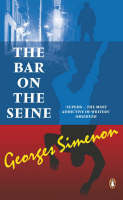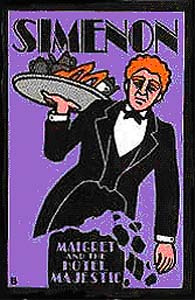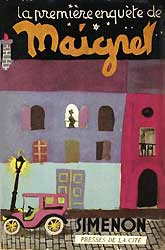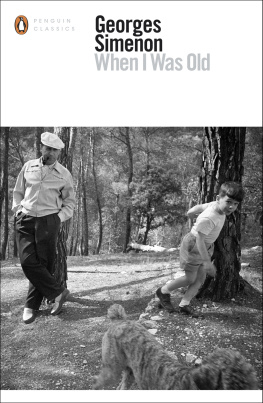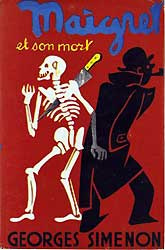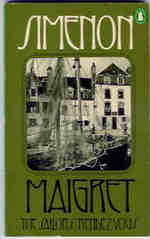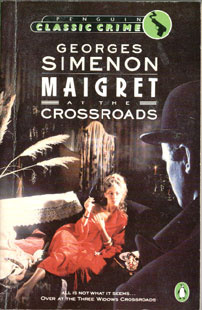Georges Simenon - Maigrets Rival
Here you can read online Georges Simenon - Maigrets Rival full text of the book (entire story) in english for free. Download pdf and epub, get meaning, cover and reviews about this ebook. year: 1994, publisher: Mariner Books, genre: Detective and thriller. Description of the work, (preface) as well as reviews are available. Best literature library LitArk.com created for fans of good reading and offers a wide selection of genres:
Romance novel
Science fiction
Adventure
Detective
Science
History
Home and family
Prose
Art
Politics
Computer
Non-fiction
Religion
Business
Children
Humor
Choose a favorite category and find really read worthwhile books. Enjoy immersion in the world of imagination, feel the emotions of the characters or learn something new for yourself, make an fascinating discovery.
- Book:Maigrets Rival
- Author:
- Publisher:Mariner Books
- Genre:
- Year:1994
- Rating:3 / 5
- Favourites:Add to favourites
- Your mark:
- 60
- 1
- 2
- 3
- 4
- 5
Maigrets Rival: summary, description and annotation
We offer to read an annotation, description, summary or preface (depends on what the author of the book "Maigrets Rival" wrote himself). If you haven't found the necessary information about the book — write in the comments, we will try to find it.
Maigrets Rival — read online for free the complete book (whole text) full work
Below is the text of the book, divided by pages. System saving the place of the last page read, allows you to conveniently read the book "Maigrets Rival" online for free, without having to search again every time where you left off. Put a bookmark, and you can go to the page where you finished reading at any time.
Font size:
Interval:
Bookmark:
Maigret's Rival
The Maigret Saga - novel 24
Georges Simenon
Copyright 1944 by Editions Gallimard as L'inspecteur Cadavre
. English translation by Helen Thomson copyright 1979 by Georges Simenon.
CONTENTS
1 The Evening Local
Maigret surveyed his fellow passengers with wide-open, sullen eyes and, without meaning to, assumed that self-important look people put on when they have spent mindless hours in the compartment of a train.
Well before the train began to slow down as it approached a station, men in large, billowing overcoats started to emerge from their various cells, clutching a leather briefcase or a suitcase, in order to take up their positions in the corridor. There they would stand with one hand casually gripping the brass bar across the window, oblivious, or so it appeared, of their fellow travelers.
Huge raindrops were making horizontal streaks across this particular train window. Through the transparent, watery glass the Superintendent saw the light from a signal tower shatter into a thousand pointed beams, for it was now dark. Farther down, he glimpsed streets laid out in straight lines, glistening like canals, rows of houses that all looked exactly the same, windows, doorsteps, sidewalks, and, in the midst of this universe, a solitary human figure, a man in a hooded coat hurrying somewhere or other.
Slowly and carefully, Maigret filled his pipe. In order to light it, he turned in the direction the train was going. Four or five passengers who, like himself, were waiting for the train to stop so that they could slip away into the deserted streets or quickly make their way to the station restaurant stood between him and the end of the corridor. Among them, he recognized a pale face, which immediately turned the other way.
Old Cadaver!
The Superintendent's immediate reaction was to groan:
"He's pretending he doesn't see me, the idiot."
Then he frowned. Why on earth would Inspector Cavre be going to Saint-Aubin-les-Marais?
The train slowed down and pulled into the station at Niort. Maigret stepped onto the cold and wet platform, and called to a porter:
"How do I get to Saint-Aubin?"
"Take the 6:17 train on Platform Three."
He had half an hour to wait. After a brief visit to the men's room, at the very end of the platform, he pushed open the door of the station restaurant and walked over to one of the many unoccupied tables. He then dropped wearily on a chair and settled down to wait in the dusty light.
Old Cadaver was there, at the other end of the room, sitting, as Maigret was, at a table with no cloth on it, and again he pretended not to have seen the Superintendent.
Cavre was his real name, Justin Cavre, but he had been known as Old Cadaver for twenty years, and everyone at the Police Judiciaire used this nickname when referring to him.
He was ridiculous, sitting stiffly in his corner with his constipated air, shifting uncomfortably in order to avoid meeting Maigret's eye. He knew the Superintendent had seen him; that was obvious. Skinny, sallow, with reddened eyelids, he made you think of the sort of schoolboys who skulk peevishly around the playground, although they long to join in the fun.
Cavre was just that kind of person. He was bright. He was probably the most intelligent man Maigret had come across in the police force. They were both about the same age. Actually, Cavre had a better educational background, and had he persevered, he could well have become a superintendent ahead of Maigret.
Why, even as a young man, had he given the impression of carrying the weight of some curse on his narrow shoulders? Why did he give them all black looks, as if he thought each and every one of them was out to get him?
"Old Cadaver has just started on his novena."
It was an expression often heard at the Quai des Orfvres some years ago. At the slightest provocation, or sometimes for no reason at all, Inspector Cavre would suddenly embark on a cure of silence and mistrust, a cure of hatred, one might say. For a week at a time he would not say a word to anyone. Sometimes, his colleagues would catch sight of him chuckling to himself, as though he had seen through their supposedly evil schemes.
Few people knew why he had suddenly left the police force. Maigret himself did not learn the facts until later, and had felt very sorry for him.
Cavre loved his wife with the jealous, consuming passion of a lover rather than with the feelings of a husband. What exactly he found so beguiling about that vulgar woman, who had all the aggressive mannerisms of a call girl or a phony movie star, one could only surmise. Nevertheless, the fact remained that it was because of her that he had got into serious trouble while on the force. A story of kickbacks had sealed his fate. One evening, Cavre had emerged from the Chiefs office with his head down and his shoulders drooping. A few months later he was known to have set up a private detective agency above a stamp shop on Rue Drouot.
People were having dinner, each in his own aura of boredom and silence. Maigret finished his half-pint of beer, wiped his mouth, picked up his suitcase, and walked past his former colleague at a distance of less than two yards, but Cavre continued to stare down at a patch of spit on the floor.
The little train, looking black and wet, was already at Platform Three. Maigret climbed into a cold, damp compartment of the old-fashioned type and tried in vain to shut the window properly.
People were walking back and forth on the platform outside, and the Superintendent heard other familiar sounds. The compartment door opened two or three times and a head appeared. Each passenger was trying desperately to find an empty compartment. Whenever one of them caught sight of Maigret, the door shut again.
Once the train had started to move, the Superintendent went out into the corridor to close a window that was causing a draft. In the compartment next to his, he saw Inspector Cavre, who this time was pretending to be asleep.
There was nothing to be alarmed about. It was silly to keep brooding on this strange coincidence. The whole thing was nonsensical, and Maigret would have liked to simply shrug it off.
What difference did it make to him if Cavre was also going to Saint-Aubin?
Darkness sped by outside the windows, shot through from time to time with a flicker of light, the headlights of a car, or, more mysterious and inviting, the yellowish rectangle of a window.
Examining Magistrate Brjon, a delightful, rather shy man of old-fashioned courtesy, had repeated over and over again:
"My brother-in-law, Naud, will meet you at the station. I've told him you're coming."
And Maigret kept thinking obsessively as he drew on his pipe:
"What on earth can Old Cadaver be up to?"
The Superintendent was not on an official case. Brjon, with whom he had worked so often, had sent him a short note asking him if he would be good enough to pop into his office for a few moments.
It was January, and raining in Paris, as it was in Niort. It had been raining for more than a week, and the sun had not once peeked out. The lamp on the desk in the Examining Magistrate's office had a green shade. While Monsieur Brjon was talking, and constantly cleaning the lenses of his spectacles as he did so, Maigret reflected that he, too, had a green lampshade in his office, but that the one he was looking at now was ribbed like a melon.
"So sorry to bother you especially since it's not a professional matter. Do sit down But of course A cigar ? You may perhaps know that my wife's maiden name is Lecat It doesn't matter. That's not what I want to discuss My sister, Louise Brjon, became Madame Naud when she married"
It was late. People outside looking up at the gloomy faade of the forbidding Palais de Justice and seeing the light on in the Examining Magistrate's office would no doubt think that serious issues were being debated up there.
Next pageFont size:
Interval:
Bookmark:
Similar books «Maigrets Rival»
Look at similar books to Maigrets Rival. We have selected literature similar in name and meaning in the hope of providing readers with more options to find new, interesting, not yet read works.
Discussion, reviews of the book Maigrets Rival and just readers' own opinions. Leave your comments, write what you think about the work, its meaning or the main characters. Specify what exactly you liked and what you didn't like, and why you think so.




